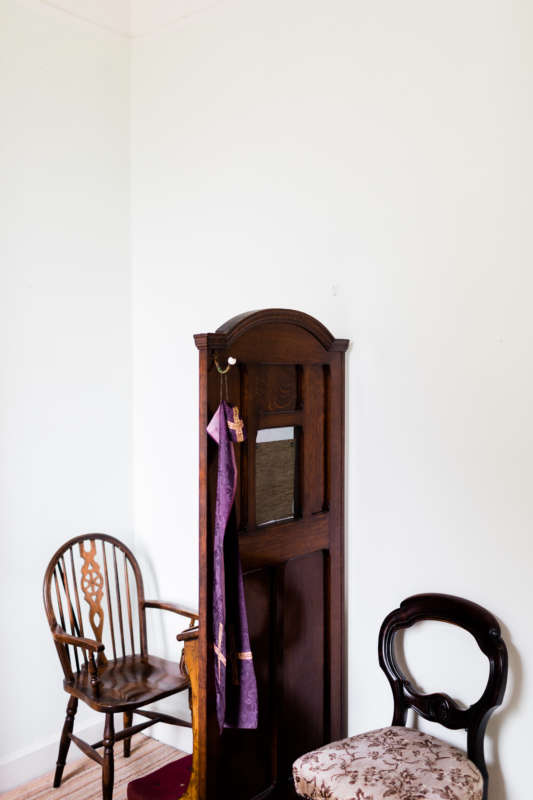The false self is often seen as ‘the idealized self’ or the self through which we operate because our true self just somewhere along the line (usually quite young) felt too weak, inadequate, or overwhelmed to function and gain approval in the situation in which it finds itself.
Tian Dayton, Clinical Psychologist

The Act of Confession
I remember it like it was yesterday.
My mom and I would go to “confession” and wait patiently in the back pew of the church, quiet and pensive. I’d look around, watching and wondering, “What is this all about?” People going in and out of a big box crafted of wood with ornately carved edges. Inside, icons of Mother Mary and Jesus, and one square pillow made of crimson velvet. I don’t remember being frightened or fearful, just perplexed.
Why are we here? Why are we going into that box to talk to a man behind a screen?
When it was my turn, I’d step up into the box, turn slightly to the left, and kneel before a scrim that covered a little window. All of a sudden, the ominous little window would open and a deep voice would say, “Welcome child.”
With no hesitation at all, I’d softly repeat words I had been taught in parochial elementary school, “Forgive me Father for I have sinned, it’s been __________ weeks since my last confession.”
I then confessed all of my sins.
The voice from the other side would speak of forgiveness and assign some form of penance: 100 Hail Mary’s, 15 Our Fathers.
Faithfully and earnestly, I heeded the instructions of “the other side,” and moved to the front altar of the sanctuary, to kneel before the big cross with Jesus hanging on it, and say my penance.
Awakening to Our True Self

True introspection is not finding ourselves, in a sense of who we are on our own, but should rather be an exercise in finding who we might be, especially in the eyes of God.
Bernard McGinn
The big brown box taught me a very important life lesson: The act of confession is an essential spiritual practice. It makes space for inner work. It allows introspection and reflection on my thoughts, my deeds, my words. It helps me see where transformation and personal growth needs to happen.
- It awakens my truest self.
- It gives me time to think about how I am living my life, on a day-to-day basis.
- It slows the pace of my life down and reminds me of the Eternal, not the Urgent.
- It affords me the necessary time and space to look inward. Not navel gazing, but true, wholehearted inner work.
- It makes sacred space for connecting with God, my Father, in order to have life-giving conversations that lead, direct, and guide me.
In that quiet space, we might hear the whispers of God:
- Let’s look at that tone of voice. Maybe soften it a bit.
- Why are you trying to get the approval of _____________?
- Pay attention to that negative thought cycle that rears its’ ugly head every time you feel threatened or out of control.
- Why do you consistently use shame language to yourself? Notice how you are shoulding all over yourself.
- Why are you allowing so-and-so to control your every thought? You can think for yourself.
- And, the sweetest whisper of all, “Child, please remember you are very loved. You have value, worth, and dignity.”
Making Space for Inner Work

“Gratitude unlocks the fullness of life. It turns what we have into enough, and more. It turns denial into acceptance, chaos to order, confusion to clarity. It can turn a meal into a feast, a house into a home, a stranger into a friend.”
Melody Beattie
This past week, I sat with several women who are finding it very hard to participate in the act of confession. They’ve come to my “breathing room,” i.e., my counseling space, and even though it looks very different from the big brown box of my childhood, it is a sacred space in which time is given to the hardest of all tasks: our own inner work. Here, I hold space for their hearts to heal.
Thankfully, I’m not hiding behind a screen. There is absolutely no barrier or dividing line, due to the glorious truth that we can access Jesus all on our own. We no longer need a mediator.
We just need to come.
It isn’t easy, I know. But, it is empowering.
This week’s intention:
Join this week’s conversation. Be sure to subscribe to all our resources: janellrardon.com
Find sacred space to examine our hearts. To check in with our Eternal essence. To talk to God our Father and practice the art of confession. As our fellow Scots say, “Confession is good for the soul.”
